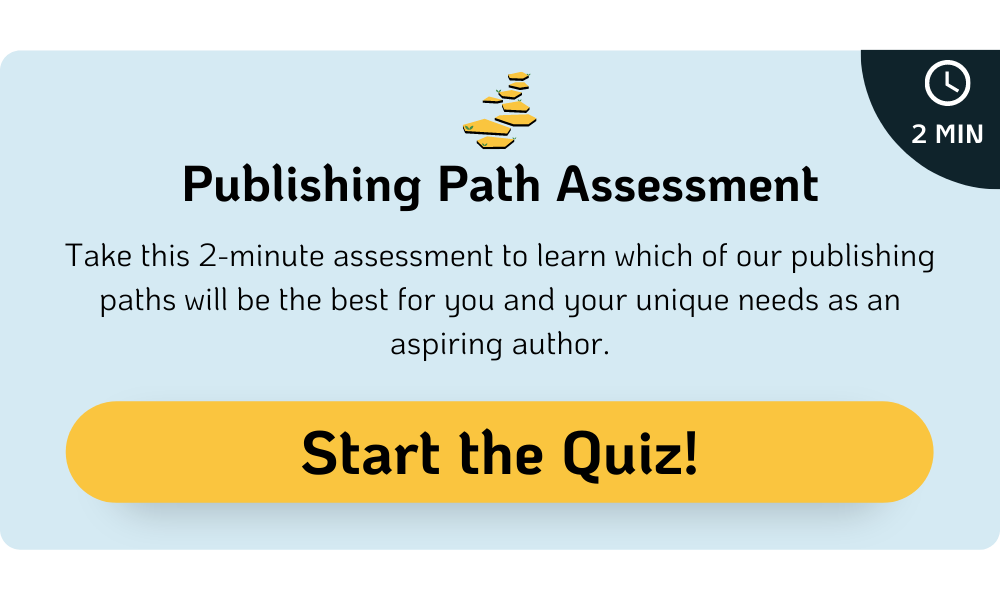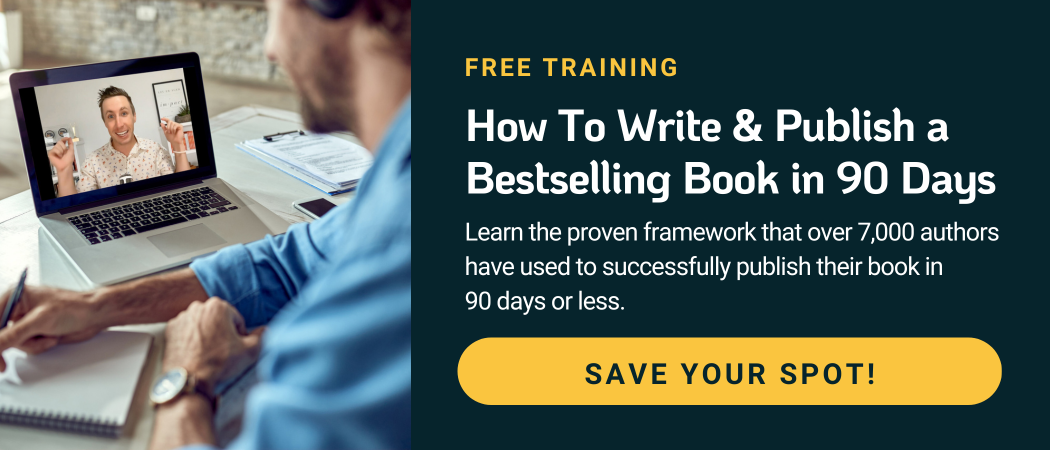The copyright laws for authors are extensive, and confusing. It’s also one of the biggest sensitivities authors have. You likely have nightmares of people stealing your work.
You’ve worked really hard on your book idea. You’ve taken years to fine tune it, build up the confidence to create it and share it with the world. The idea of someone stealing your book—or even just its idea—is horrifying.
Can, in the blink of an eye, all that work be for nothing if someone else publishes it before you?
The truth is that there’s a lot—too much—information online about copyright. The copyright laws for authors can get confusing, fear mongering runs amuck, and horror stories steal the spotlight.
But those stories do happen, and it’s important to know the legality of what you’re getting into when you decide to not only write a book, but publish it as well, especially if you choose to self-publish and lack the protections of a traditional publishing house.
But that’s what this master copyright for authors article is for.
Here are the sections we’ll cover, in detail, about copyright laws for authors:
- The REAL Concern
- What is copyright?
- Safeguarding Your Work: How-To
- Using Others’ Work: Infringement & Fair Use
- Your Work Was Stolen: Your Options
What You’re Really Worried About With Copyright Laws for Authors…
First, let’s discuss what brought you here to learn about the copyright laws for authors. It’s usually not because you have an instance in which someone has stolen your work. Right?
After helping literally thousands of authors in less than a decade, it’s become clear to us that what this copyright fear is has more to do with fear in general than fear of someone stealing your work. Because here’s the thing…
Publishing a book is a lot of work. It’s not just the core idea, but also the stories and memories that will go into shaping it. Structuring the book. Actually writing it in an engaging and helpful way. Then there’s the book production process of cover design, formatting, book editing, and the likes. Then there’s the entire publishing process that, if not done correctly, can land your book in NoMan’s Land instead of the bestseller list.
It’s intimidating. It can take a long time. But most authors don’t know how to verbalize these fears yet. Instead, they know of one fear they can think of, and latch onto the many horror stories they’ve read of self-published authors’ books being copied on Amazon, and another person making money that should be rightfully theirs.
If this is you, we feel you. But don’t let a fear of copyright overshadow other concerns you have. Because before a book can be stolen, it has to be published. If you’re an author who hasn’t even started writing yet and you’re reading this, take a breather. Save this worry for if it’s actually something you need to be concerned about.
Because the truth is that there are some concerns about copyright for some authors depending on the type of book they want to write, what they’ll include in it, and even their platform. You may be at a higher risk of running into copyright issues.
The only real way to determine if you are at risk or not is to talk to someone who can set you straight—someone experienced in this world.
Our experts are here for that. You can schedule a call for a free 1-hour strategy call with a publishing coach to get not just your copyright questions answered, but to understand the path you’re heading down as an author.
What is a copyright?
Copyright is a legal right that grants the creator of an original work exclusive rights to its use and distribution, usually for a limited time, with the intention of enabling the creator to receive compensation for their intellectual effort.
Copyright applies to a wide range of creative, intellectual, or artistic forms, or “works”. These include poems, theses, plays, books, other literary works, movies, dances, musical compositions, audio recordings, paintings, drawings, sculptures, photographs, software, radio and television broadcasts, and industrial designs.
Copyright laws for authors are typically enforced by the holder of the copyright. Meaning in order to uphold a book’s copyright, for example, the author themselves would have to be notified of this and seek methods to stop the other person from using it.
In some cases, websites like Amazon will create their own type of copyright detection. Unfortunately for authors, this mostly applies to the use of images on book covers and inside the works. For unclear reasons, this same technology is not in place for the book’s written content.
Here’s an example a book’s copyright page:
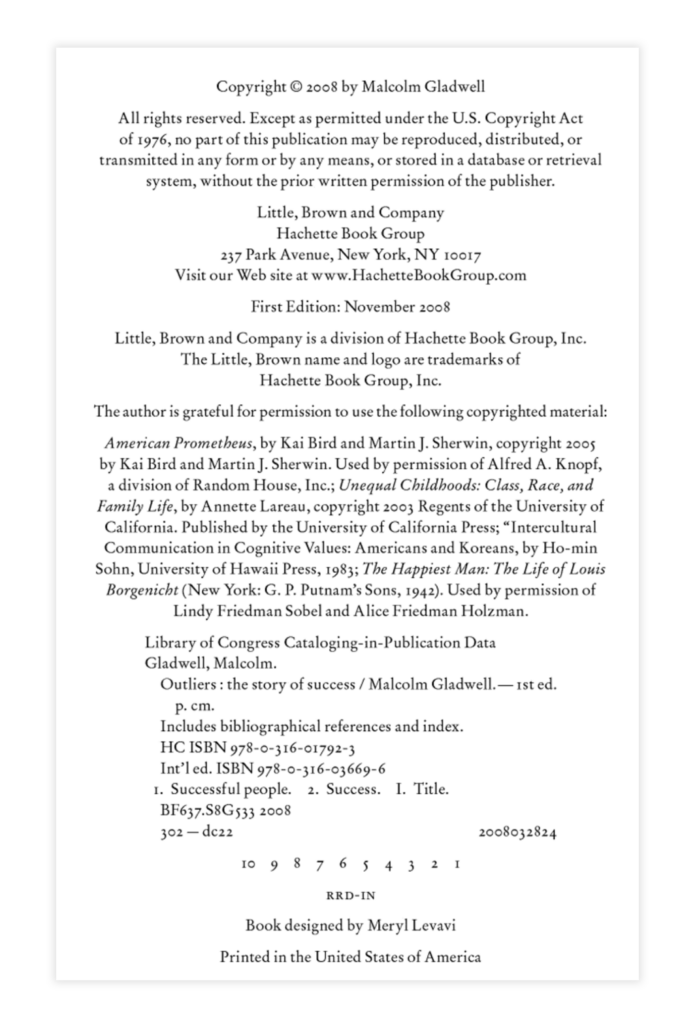
Safeguarding Your Work: Copyright FAQ
If you’re worried about your work being stolen, and have reason to be, this section will help you know what’s necessary to keep your content safe—and yours.
How do I copyright my book?
Copyright laws for authors in this case is very easy. A book is technically in place the moment you start working on it. If you have the ideas, the notes, the documents that prove it’s yours, then your work is copyrighted.
However, in order to pursue a copyright infringement case in which you believe someone has taken your work, you will need to register your work in order to stop the other person from using your book. It has to be on record, though that’s very easy to do.
In order to do that, you can read this post about how to copyright a book that’s dedicated to a step-by-step breakdown of doing this.
What is copyright infringement?
Copyright infringement occurs when someone uses, copies, or distributes your copyrighted work without permission. This includes reproducing, performing, or displaying your work publicly without authorization. Infringement can occur even if the whole work is not used, as any substantial portion can be protected. It’s important to understand your rights as a copyright holder and take legal action if you believe your work has been infringed upon.
In most cases when it comes to these copyright laws for authors, it happens when book pirates steal an author’s book and uploads it to publishing sites like Amazon with a different cover and under a different name, like this author:
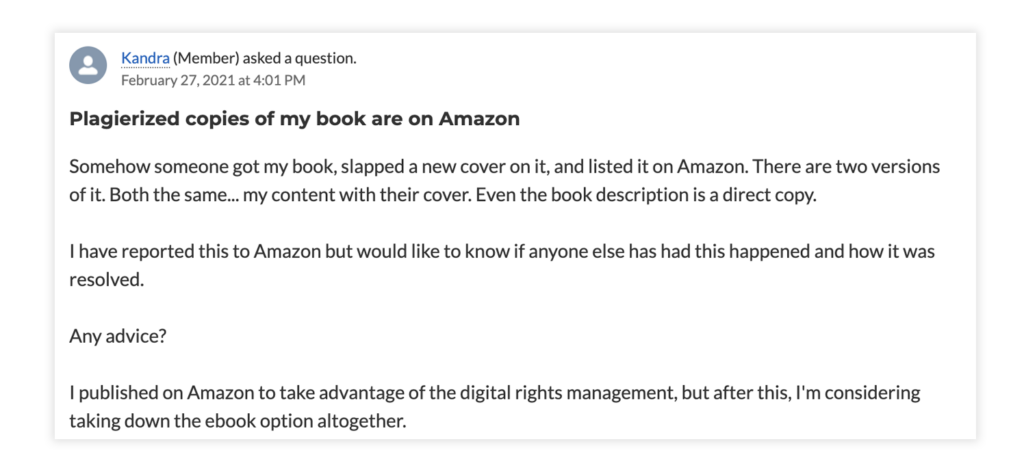
To find out what to do about this case of copyright infringement, see this section below.
How can I protect my writing?
To protect your writing, you can use copyright laws for authors. Copyright automatically applies to your work as soon as it’s created and fixed in a tangible form, such as writing it down. Registering your work with the relevant copyright office can provide additional legal protection, as mentioned above.
But there’s nothing special you need to do to protect your writing before it’s published if you don’t want to. It’s hardly at risk at this point, but you still can protect unpublished works.
How can I protect unpublished writing?
You can protect unpublished writing by keeping it confidential and only sharing it with trusted individuals or entities under a nondisclosure agreement (NDA, more on this below). Copyright also protects unpublished works in most countries.
If you go to the official Copyright website, you will be able to register the actual copyright for unpublished work, but have a limit of 10, as you can see in the note below:

What is considered idea theft?
Idea theft, also known as idea misappropriation, occurs when someone takes and uses someone else’s idea without permission or compensation, typically in a way that deprives the originator of the idea of the opportunity to develop or profit from it.
This is largely a concern of authors who take to online forums, like Reddit writing groups, in order to share ideas or get feedback. At times, there may be people who take your ideas and turn them into their own works. This isn’t especially likely, and even if they do take your idea, they will never create the book you will.
How do I make sure my book idea isn’t copied?
To ensure your book idea isn’t copied, keep detailed records of your idea’s development, including notes, drafts, and any correspondence related to the idea. You can also register your work with the relevant copyright office just to ensure it’s protected.
But honestly, just keeping your notes and ideas written down—and not just in your head—is enough to save them. Make sure to date these documents if they’re not online with the date automatically recorded.
Even something as simple as a Google drive document is enough to fulfill the copyright laws for authors necessary to protect your book, and Google saves the date automatically.
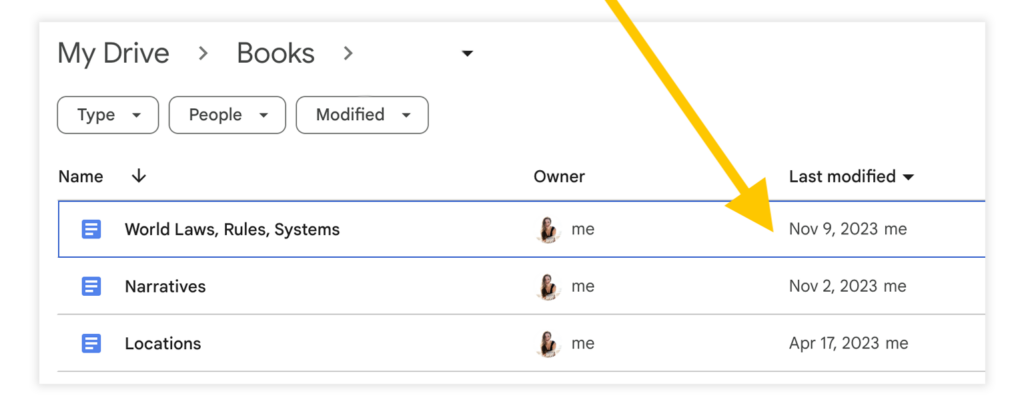
Is plagiarism the same as copyright infringement?
Plagiarism and copyright infringement are related but different.
Plagiarism is the act of using someone else’s work, ideas, or expressions without proper acknowledgment or citation, passing them off as your own (more on citation below). Plagiarism can occur regardless of whether the work is protected by copyright.
Copyright infringement, on the other hand, occurs when someone violates the exclusive rights of a copyright holder, such as reproducing, distributing, performing, or displaying a copyrighted work without permission. Copyright infringement is a violation of the rights granted to the copyright holder under copyright laws for authors.
While plagiarism can involve copyright infringement, not all cases of plagiarism involve copyright violation. For example, using public domain works without proper attribution would be considered plagiarism but not copyright infringement, as the works are not protected by copyright. Conversely, copying a copyrighted work with permission but without proper citation could be considered copyright infringement but not plagiarism.
How do I make sure my book idea isn’t plagiarized?
To prevent plagiarism of your book idea, focus on developing a unique and original concept. If you find that someone has copied your work without permission, you can take legal action under copyright laws for authors.
Ultimately, you can’t, with 100% accuracy, prevent plagiarism. It happens all the time, and sometimes even on accident. This is why there are so many plagiarism checkers in softwares like Grammarly and others. Because most people don’t always intend to plagiarize.
How do I make sure my book idea isn’t duplicated?
To prevent your book idea from being duplicated, consider registering your work with the relevant copyright office and keeping detailed records of your idea’s development.
The truth about ideas is that many, many people have similar ideas. While they might not be the same, some authors have ideas for books that can make it easy to think they copied your idea. The best thing you can do is to make your book completely yours, told from your unique perspective. Then, it doesn’t matter who has your idea. They won’t have your book.
How can I protect my book idea from being stolen?
To protect your book idea from being stolen, consider using copyright laws for authors, keeping detailed records of your idea’s development, and only sharing your idea with trusted individuals or entities under a nondisclosure agreement (NDA).
What this does is safeguards your book’s development history. So if there ever is an instance in which your book has been stolen, you have clear evidence that the book is yours if it ever goes to the level of needing that evidence. It rarely does.
How do I patent my idea?
While you can’t patent a book idea, you can patent certain aspects of your work if they meet the requirements for patentability, such as a unique method or process related to the creation or distribution of your book. This isn’t so much one of the copyright laws for authors, but not a bad idea, especially if you want to build a business connected to your work.
There’s a lot that goes into a patent, and you’re best getting that information from a more dedicated source like this. Ultimately, if you patent an idea in your book, you’ll be able to better defend yourself when others break the copyright laws for authors in this case.
Should I have beta readers sign an NDA?
Having beta readers sign an NDA can help protect your work and ideas during the beta reading process. It’s a personal choice, but it can provide an extra layer of legal protection and is part of the copyright laws for authors you’ll find out there.
Because beta readers are so important for the polishing of a draft, never avoid them just because you’re worried they’ll steal your work. This is very common in the writing world and can be solved by having them sign an NDA.
Should I have my editor sign an NDA?
Having your editor sign an NDA can also help protect your work and ideas. Again, it’s a personal choice, but it can be a prudent step, especially if you’re concerned about the confidentiality of your work.
I will say though, as an editor, they will not steal your work. It’s not exactly good for business, and your work is not likely to make them the income necessary for them to quit their editing job. Your work is safer with an editor than with the general public, like beta readers.
How do I write a confidentiality agreement or NDA?
To write a confidentiality agreement or NDA, you should clearly define the confidential information being protected, specify how it can be used and shared, and outline the consequences of breaching the agreement. It’s advisable to consult with a legal professional to ensure your agreement is legally enforceable.
But you can also find a lot of examples or templates of NDAs online.
Here’s an example of what an NDA might look like:
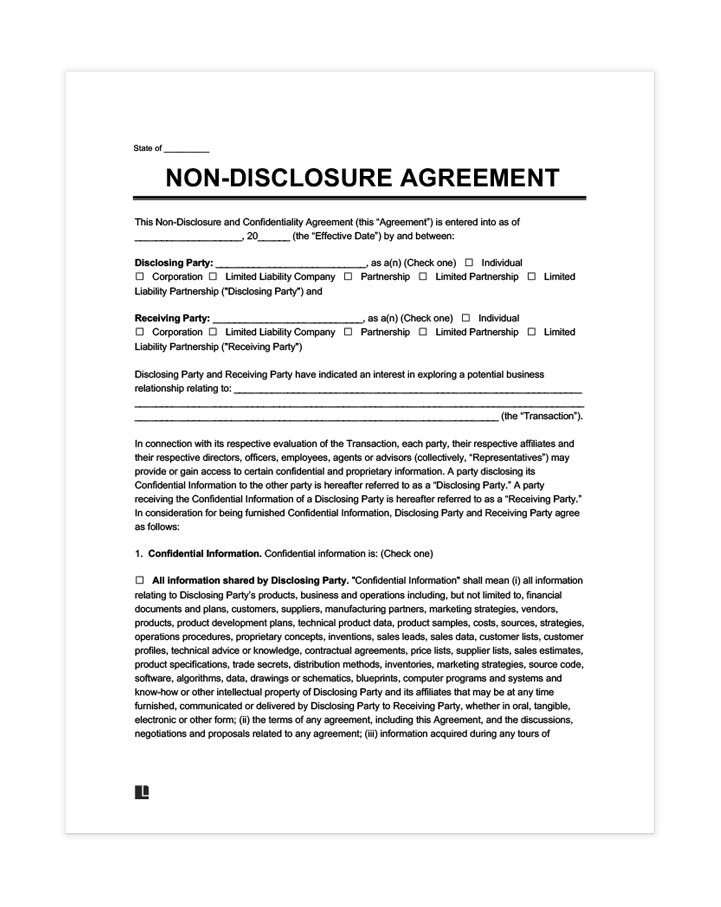
Using Others’ Work in Your Writing: Copyright Rules, Laws, Fair Use
Sometimes, especially when writing a nonfiction book, you may want to use another person’s work. In this case, you still have to know some copyright laws for authors as it relates to using that work the right way.
You can quote people. You can cite their work. Here’s what you have to know about these copyright laws for authors.
What is fair use law?
Fair use is a legal doctrine that allows the limited use of copyrighted material without permission from the copyright holder for purposes such as criticism, comment, news reporting, teaching, scholarship, or research. Fair use is determined on a case-by-case basis and considers factors such as the purpose of the use, the nature of the copyrighted work, the amount used, and the effect on the market for the original work.
For books, this might mean reading a section or using quotes in a review. The amount of the book used can’t exceed 10% of a given chapter, book, or words in the book.
Tread carefully here. While it’s fair use, you can run into issues of defamation if used solely to criticize. You also may need to be aware of these copyright laws for authors when you see pieces of your work online. It’s fair use if it’s not excessive—and not used to make money.
How to quote another sources in your writing
When quoting another source in your writing, you should use quotation marks to indicate the quoted text and provide a citation to credit the original source. The citation should include the author’s name, the title of the work, the publication date, and the page number (if applicable). This helps to avoid plagiarism and gives credit to the original author, keeping you in the clear of violating copyright laws for authors.
How to properly cite sources in a book
To properly cite sources in a book, you should follow a specific citation style, such as APA, MLA, or Chicago. Each style has its own rules for formatting citations, so it’s important to consult the style guide relevant to your field of study or publication. Generally, you’ll need to include the author’s name, the title of the work, the publication date, and other relevant information depending on the type of source (e.g., book, journal article, website).
This resources has great information on how to cite sources in your nonfiction book, and the options to do so while complying with copyright laws for authors.
When do copyrights expire?
Copyright laws for authors expire after a certain period of time, depending on the country and the type of work. In the United States, for works created after January 1, 1978, the copyright lasts for the life of the author plus 70 years. For works created before 1978, the rules are more complex, but generally, the copyright lasts for 95 years from the date of publication.
Places like Project Gutenberg take advantage of these expirations by creating libraries of work.
Keep in mind that this doesn’t mean the copyright laws for authors are completely void. You can’t take these expired works and sell them for yourself.
What is public domain in copyright?
Public domain refers to works that are not protected by copyright and are therefore free for anyone to use without permission from the copyright holder. This is where you’ll often see retellings in books, and how they’re legal to write.
Works enter the public domain for various reasons, such as the expiration of copyright, the failure to meet copyright requirements, or the intentional dedication of the work to the public domain by the copyright holder.
In the United States, works published before 1923 are generally considered to be in the public domain. For works published after 1923, the rules are more complex and depend on factors such as the date of publication, whether the work was registered with the U.S. Copyright Office, and whether the copyright was renewed.
When does something enter public domain?
Something enters the public domain when its copyright expires or if it was never eligible for copyright protection. Once in the public domain, anyone can use the work without permission from the copyright holder. The rules for when a work enters the public domain vary by country and depend on the copyright laws for authors in place.
This doesn’t mean taking the original work and publishing it and making money from it. But you can use the idea and original concept to create something unique, and still comply with the copyright laws for authors.
Is copying a book illegal?
Copying a book without permission from the copyright holder is generally illegal and breaks the copyright laws for authors. However, there are exceptions, such as fair use (as discussed earlier), which allows for limited use of copyrighted material without permission. It’s important to understand and respect copyright law when using or copying someone else’s work.
This is how writers can get away with fanfiction, and how most writes can’t do anything about it.
Your Work Was Stolen: Copyright Laws for Authors & What To Do
So, you did everything right. You followed all the copyright laws for authors…and someone still took your work. The book pirates are at it again, and you’re a victim.
Let’s take a look at all of these situations and what you can do about them.
What is considered copyright infringement in books?
Copyright infringement in books occurs when someone uses, reproduces, distributes, or displays a substantial portion of a copyrighted book without permission. This can include copying text, illustrations, or other original elements of the book without authorization.
Most often in the book world, copyright laws for authors are violated when a pirate steals a book’s content, and publishes it under their own account with a new cover.
What to do if my book was copied on Amazon?
If you discover that your book has been copied and is being sold on Amazon without your permission, you can take several steps. First, you should gather evidence of the infringement, such as screenshots of the infringing material and any correspondence with the infringer.
Then, you can report the infringement to Amazon by using their online infringement report form. Amazon will investigate the claim and take appropriate action, which may include removing the infringing material from their platform.
To do this, head to Amazon’s infringement report page, and follow the prompts to report the product:
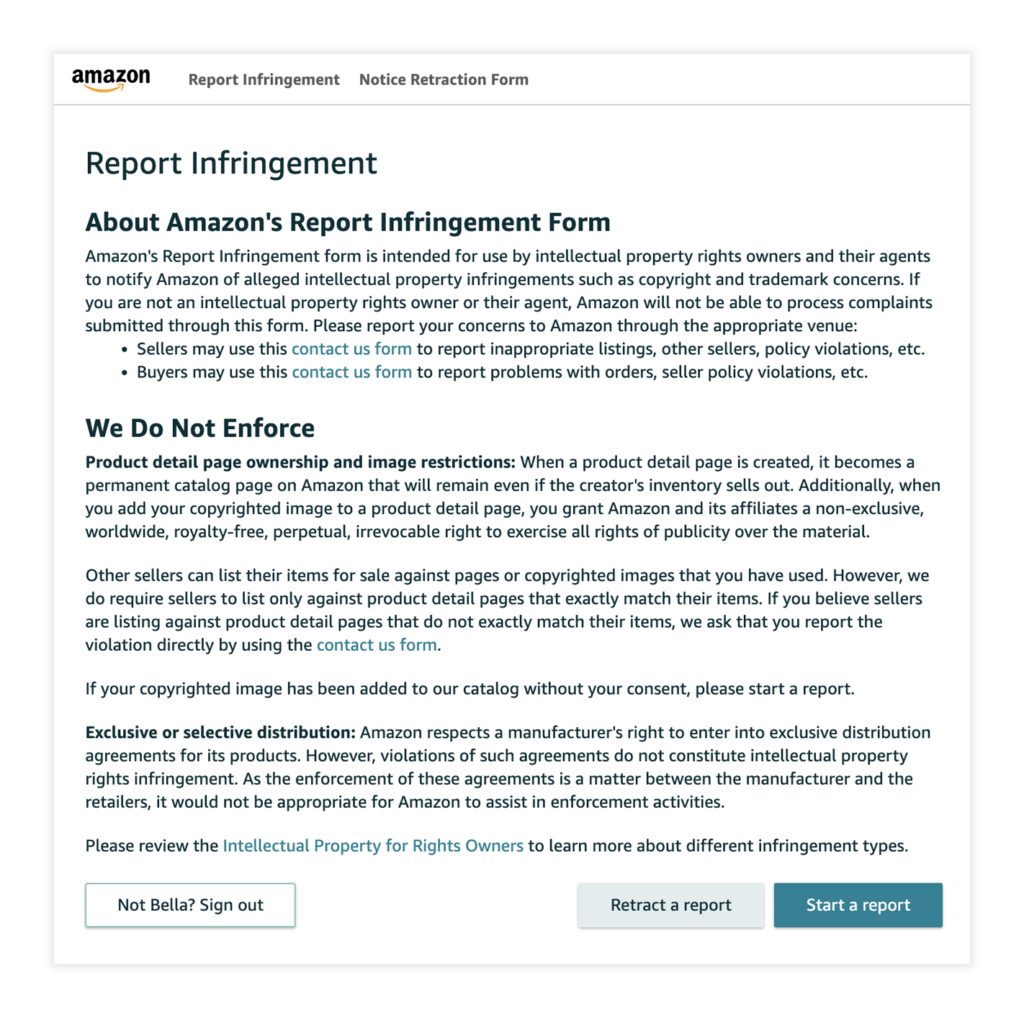
Amazon does tend to take the violation of copyright laws for authors seriously, though it may take some time.
How do I sue if someone they violated my book’s copyright?
If someone has violated the copyright laws for authors, you can sue them for copyright infringement in civil court. To do so, you would need to file a lawsuit in the appropriate jurisdiction and prove that the defendant copied your work without authorization. You may be entitled to damages, including any profits the defendant made from the infringement, as well as your own losses.
Many who break the copyright laws for authors can be scared off by submitting a cease and desist. Lawyer fees are expensive and not many people want to deal with it. They’re caught. They’ll likely shut it down.
If not, proceed with the lawsuit by obtaining a lawyer.
Do I need a lawyer to sue if my book was stolen?
While you can technically file a lawsuit without a lawyer, it is generally advisable to seek legal counsel if you believe your book has been stolen. Copyright laws for authors can be complex, and an experienced copyright attorney can help you navigate the legal process, gather evidence, and present your case effectively.
Additionally, having a lawyer can increase your chances of success and help ensure that you receive fair compensation for the infringement of copyright laws for authors. They won’t just remove the book, they’ll pay you for damages.
Can someone publish my book as theirs when the copyright has expired?
No, someone cannot publish your book as theirs even if the copyright has expired. That’s not how copyright laws for authors work.
Once a work’s copyright has expired and it enters the public domain, anyone can use the work without permission. However, they must still acknowledge the original authorship of the work. Attempting to publish a public domain work as one’s own without acknowledging the original author would be considered plagiarism, which is unethical and can have legal consequences, even though the work itself is no longer protected by the copyright laws for authors.
Understanding all the copyright laws for authors is a lot. Even this blog post itself is extensive in this topic. That’s why we help our authors focus on what matters most, while taking care of the concerns related to copyright laws for authors.
If you’re ready to just write your book, sign up for this free class to learn the most important steps:

